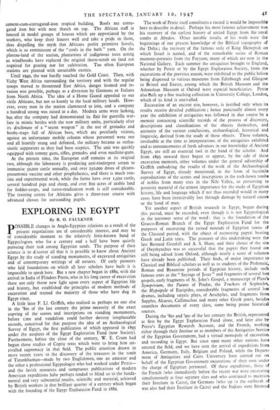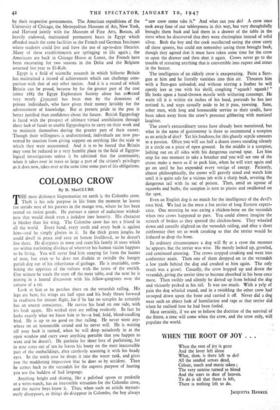EXPLORING IN EGYPT
By R. 0. FAULKNER
POSSIBLE changes in Anglo-Egyptian relations as a result of the present negotiations are of considerable interest, and may be of considerable moment to the relatively little-known band of Egyptologists who for a century and a half have been quietly pursuing their task among Egyptian sands. The purpose of their science is to discover all that it is possible to know about Ancient Egypt by the study of standing monuments, of excavated antiquities and of contemporary writings of all natures. Of early pioneers who laid foundations on which all later scholars have built it is impossible to speak here. But a new chapter began in 1880, with the arrival in India of Flinders Petrie, who in his long career of excavation there not only threw new light upon every aspect of Egyptian life and history, .but established the principles of modern methods of excavation and trained the majority of those who have dug in Egypt since.
A little later F. Ll. Griffith, who realised as perhaps no one else in the '8os of .the last century the prime necessity of the exact copying of the scenes and inscriptions on standing monuments, before time and vandalism could further destroy irreplaceable records, conceived for that purpose the idea of an Archaeological Survey of Egypt, the first publication of which appeared in 1893 under the auspices of the Egypt Exploration Fund (now Society). Furtherrhote, before the close of the century, W. E. Crum had begun those studies of Coptic texts which were to bring him un- rivalled supremacy in that field. The public attention drawn in more recent years to the discovery of the treasures in the tomb
of Tutankhamun—made by two Englishmen, one an amateur and the other a professional Egyptologist who had worked under Petrie— and the lavish resources and sumptuous publications of modern American expeditions ha've perhaps tended to blind us to the funda- mental and very substantial results, scientific and material, achieved by British workers in that brilliant quarter of a century which began with the founding of the Egypt•Exploration Fund in 1882. The work of Petrie itself constitutes a record it would be impossiblat here to describe in detail. Perhaps his most famous achievement was his recovery of the earliest history of united Egypt from the royal tombs at Abydos. Other notable results of his work were the beginnings of our present knowledge of the Biblical topography of the Delta ; the recovery of the famous stele of King Meneptah on which Israel is named, and of the remarkable series of Roman mummy-portraits from the Fayyum, many of which are now in the National Gallery. Each summer the antiquities brought to England, whether by Petrie or by the Egypt Exploration Society, from the excavations of the previous season, were exhibited to the public before being dispersed to various museums from Edinburgh and Glasgow to Bristol and Exeter, among which the British Museum and the Ashmolean Museum at Oxford were especial beneficiaries. Petrie also built up a fine teaching collection in University College, London, which of its kind is unrivalled.
Excavation of an ancient site, however, is justified only when its results receive detailed publication ; hence punctually almost every year the exhibition of antiquities was followed in due course by a memoir containing scientific records of the process of discovery, descriptions and classifications of the objects themselves, and accounts of the various conclusions, archaeological, historical and linguistic, derived from the study of those objects. These volumes, invaluable at the time as interpretations of the antiquities exhibited and as announcements of fresh advances in our knowledge of Ancient Egypt, are still an essential tool in the hand of the scholar. And from 1893 onward there began to appear, by the side of these excavation memoirs, other volumes under the general editorship of Griffith embodying the results of the work of the Archaeological Survey of Egypt, already mentioned, in the form of facsimile .reproductions of the scenes and inscriptions in the rock-hewn tombs of nobles from many sites in the Nile Valley, so preserving to posterity material of the utmost importance for the study of Egyptian history, life and language which if not thus recorded would in many cases have been irretrievably lost through damage by natural causes or the hand of man.
Yet another aspect of British research in Egypt, begun during this period, must be recorded, even though it is not Egyptological in the narrower sense of the word : that is the foundation of the Graeco-Roman Branch of the Egypt Exploration Fund for the purposes of excavating the ruined mounds of Egyptian towns of the Classical period, with the object of recovering papyri bearing Greek and Latin texts. The pioneers of this undertaking were the late Bernard Grenfell and A. S. Hunt, and their choice of the site of Oxyrhynchus was so successful that the papyri they found are still being edited from Oxford, although nearly a score of volumes have already been published. Their finds, of major importance to Classical and Biblical scholars as well as to students of the Ptolemaic, Roman and Byzantine periods of Egyptian history, include such famous texts as the " Sayings of Jesus " and fragments of several lost gospels, early fragments of St. John's Gospel, a manuscript of Plato's Symposium, the Paeans of Pindar, the Trackers of Sophocles, the Hypsipyle of Euripides, considerable fragments of several lost dramas, including satyric plays, of Aeschylus, and fragments from Sappho, Alcaeus, Callimachus and many other Greek poets, besides countless documents of every class, some being prime historical sources.
During the '8os and '9os of the last century the British, represented at first by the Egypt Exploration Fund alone, and later also by Petrie's Egyptian Research Account, and the French, working either through their Institut or as members of the Antiquities Service of the Egyptian Government, had a virtual monopoly of excavation and recording in Egypt. But since 190o many other nations have entered the field, and we have seen the arrival of expeditions from America, Germany, Italy, Belgium and Poland, while the Depart- ment of Antiquities and Cairo University have carried out on behalf of the Egyptian Government excavations of their own under the charge of Egyptian personnel. Of these expeditions, those of the French (who immediately before the recent war were excavating simultaneously at four separate sites and who continued to maintain their Institute in Cairo), the Germans (who up to the outbreak of war also had their Institute in Cairo) and the Italians were financed
by their respective governments. The American expeditions of the University of Chicago, the Metropolitan Museum of Art, New.York, and Harvard jointly with the Museum of Fine Arts, Boston, all heavily endowed, maintained permanent bases in Egypt which afforded much the same facilities as the French and German Institutes where students could live and have •the use of up-to-date libraries. Many of these establishments are springing to life again ; the Americans are back in Chicago House at Luxor, the French have been excavating for two seasons in the Delta and the Belgians returned last year to El-Kab.
Egypt is a field of scientific research in which hitherto Britain has maintained a record of achievement which can challenge com- parison with that of any other nation. And it is a record of which Britain can be proud, because by far the greater part of the cost (since 1882 the Egypt Exploration Society alone has collected very nearly £250,000) has been met by the donations of private individuals, who have given their money lavishly for the advancement of knowledge. But at present pride in the past is better justified than confidence about the future. British Egyptology is faced with the prospect of ultimate virtual annihilation through sheer lack of funds to enable Egyptologists to carry on their work and to maintain themselves during the greater part of their career. Though their willingness is undiminished, individuals are now pre- vented by taxation from giving support on anything like the scale to which they were accustomed. And it is to be feared that Britain may soon be reduced to a very humble place in the field of Egypto- logical investigations unless it be admitted that the community, when it takes over in taxes so large a part of the citizen's privileges as it does now, takes over at the same time some part of his obligations.



































 Previous page
Previous page